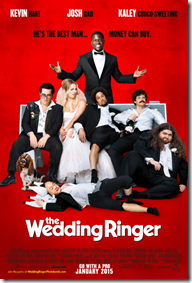The Professional Best Man: A bride’s best friend, too.
/Four years ago, I proposed a new job for myself:
The professional best man.
I was serious about the proposal but less than hopeful about my prospects, but since publishing that post back in 2011, a number of remarkable things have happened:
- Four grooms have attempted to hire me. Two lived in California. Two lived in the UK. Geography and timing (the weddings were taking place during the school year) prevented me from taking any of these gigs.
- Three reality show producers and a documentarian have contacted me about writing, consulting, and/or starring in a series about a professional best man. Two were in the US and two were in the UK.
- Kevin Hart, the actor and comedian who stars in the upcoming The Wedding Ringer (based upon the concept of a professional best man), contacted me and acknowledged that I had the idea first. He did not offer any financial compensation.
So my dream of working as a professional best man is still alive and well, but it’s recently been pointed out to me that I have been missing an entire segment of my potential customer base:
Brides.
Sure, a man might find himself in need of a professional best man, but it’s equally likely (and perhaps even more so) that a bride might feel that her future husband is in need of a professional best man, too.
She may love her man, but does she love her man’s best friend?
Not always.
And even if she thinks that her fiancée's best friend is a great guy, is he competent enough to handle all of the the responsibilities of a best man? Is he going to remain sober on the wedding day? Is he going to plan a bachelor party that will make her future husband happy while eliminating the possibility of alcohol poisoning, naked women, and police involvement?
If not, I’m your man.
I have met many outstanding best men in my role as a DJ, but I’ve also met many who are too nervous to deliver the toast, too drunk to assist a groom in need, and too disinterested in the role to be helpful in any way.
Besides, why burden your fiancée's best friend with all of these responsibilities when all he really wants to do is have a good time at the wedding as well?
Instead, hire me. Your professional best man.
What, you may ask, are my qualifications for such a job? They are, admittedly, quite extensive:
- I’ve attended more than 500 weddings as a DJ, minister, guest, groom, member of the bridal party, and best man, so there is little that I have not seen. As a result, I will be ready and able to assist in almost every unexpected or unusual circumstance.
- My experience and expertise allow me to ensure that the band, DJ, minister, photographer, caterer, and any other vendors are serving the bride and groom to my exceedingly exacting standards.
- I have extensive experience in dealing with irritable in-laws, drunken guests, angry ex-girlfriends, belligerent uncles, wedding crashers, and any other potentially disruptive wedding attendee and am adept at deflecting these distractions away from the bride and groom.
- I can deliver an outstanding toast. I am often instructing criminally- unprepared best men on what to say just minutes before their toasts and making them sound quite good.
- I am a skilled party planner and will plan a bachelor party that your fiancée loves while also ensuring that he does nothing that he will regret the next day.
- I possess a wide range of interests and am skilled at ingratiating myself to a wide range of people. I can do jock and nerd equally well and rarely meet someone who I cannot find common ground. We may not be best friends after your wedding, but for the duration of our nuptials, I will be surprisingly likable and chameleon-like in my ability to blend in with your group of friends. And who knows? One of my best friends is a former client. It could happen for you, too.
And what if you want to hire a professional best man but your fiancée has a friend who also wants the job and would be upset to learn that you went with a professional?
No problem. Simply have two best men.
One who will get drunk during the cocktail hour, hit on one of the bridesmaids during photos, deliver a humorless speech, and forget to end it with an actual toast.
The other will not drink at your wedding (except if he is capping off an amusing and heartfelt toast), will keep you fiancée's best interests in mind at all times, and is skilled and experienced enough to ensure that everything goes smoothly on your wedding day.
Doesn’t your fiancée you deserve another friend on his wedding day? A friend absent of personal needs and petty grievances. A friend who will guide him through and past every awkward, annoying, unfortunate, and potentially disastrous moment of your wedding.
Don’t you deserve the services of a professional on your wedding day?
A professional best man.


